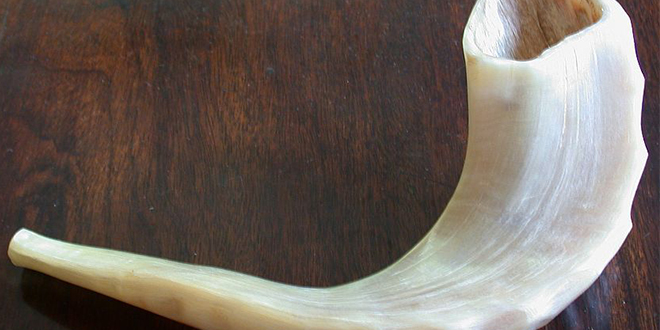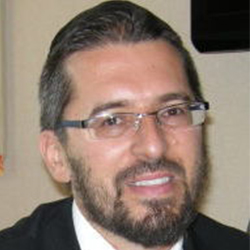09/13/2017
Chaplains Help Make High Holy Days Special at Hospitals
- Share This Story
Article reprinted with permission from Cleveland Jewish News.
By Amanda Koehn

Chaplain Rabbi Akiva Feinstein regularly blows the shofar for patients on Rosh Hashanah, but specifically remembers doing so for a boy who, suffering from an illness, spent the holiday at University Hospitals Rainbow Babies and Children’s Hospital in Cleveland.
To Feinstein’s surprise, the boy said he wanted to learn to blow the shofar himself. They began to practice diligently.
“He was very sick so he couldn’t produce as much of a sound … but said when he recovered he would keep practicing it and do it more forcefully,” Feinstein said.
Feinstein works through the Jewish Federation of Cleveland’s chaplaincy program, which has chaplains that regularly visit Jewish patients at University Hospitals and Cleveland Clinic, in addition to working full time as a chaplain at Montefiore in Beachwood. Feinstein is responsible for UH’s Ahuja Medical Center in Beachwood and UH Cleveland Medical Center in Cleveland and rotates between them about four times a week.
During the High Holy Days, the demand for and importance of Feinstein and other area hospital chaplains is even stronger.

Feinstein
“I think sometimes it’s just spending more time with people,” said Feinstein, adding that during the High Holy Days people may be more emotional, sensitive and concerned about their illnesses, especially if in the hospital. “People have more things on hearts and minds.”
Rabbi Shalom Plotkin, a chaplain for the Louis Stokes Cleveland VA Medical Center in Cleveland, also described the important role of chaplains in helping people connect to religious holidays while in the hospital.
“I think it’s hard to be in the hospital any time of the year, but especially hard when you have family traditions you know you are missing out on,” Plotkin said.
Plotkin, who is also owner of senior home care and assistance program Right at Home and a veteran, began working as a VA chaplain after being mentored by the late Rabbi Michael Hecht. Plotkin said since Hecht’s death in January, he now serves more often in his honor. He also maintains a special emphasis on helping veterans celebrate holidays with their families there. This year, he held a pre-Rosh Hashanah service Sept. 14.
“Our goal is to support the faith of our patients however that might look,” Plotkin said.
Logistical issues also arise when celebrating Jewish holidays in hospitals, especially for observant patients and their families, said Susan Stone, director of spiritual care at Hillcrest Hospital in Mayfield Heights, which chaplains and other hospital staff can help address.
“Sometimes it’s something as simple as a bell so a patient doesn’t have to push a buzzer,” she said, as observant patients will not use an electronic buzzer during holidays or Shabbat.
Stone also said Bikur Cholim, a Cleveland Heights-based nonprofit that provides assistance to families in medical crises, has its own room at her hospital where family members of patients can stay and eat kosher food. Moreover, sometimes they try to help accommodate replicating eating in a sukkah for Sukkot, among other challenges.
Stone said a big part also is educating hospital staff around Jewish holidays, so they can better meet patients’ needs.
“We try and acknowledge the holidays and educate the nurses, and might put up on the (bulletin) board, ‘Happy New Year,’ so staff know (patients) are missing something in their community,” she said.
Feinstein also said in previous years he’s put together a CD of local cantors singing holiday songs for residents. He also helped organize dancing for Simchat Torah in a hospital’s intensive care unit for a community leader, the late Rabbi Chaim Stein of Telshe Yeshiva in Wickliffe, years ago.
“One of the themes is that sometimes you have to be a little pushy to get the facilities to accommodate holidays and the rituals, but the key is when you involve (staff) and make them part of the celebrations, they really appreciate that,” Feinstein said. “It gave them a very unique, extra dimension of their job.”
Feinstein also said the only way hospitals know who is Jewish and may want to be visited by a Jewish chaplain, is when patients mark their Jewish faith in response to a question about religion on an administrative form when they are admitted. Thus, Feinstein said it’s important not to skip that question, as there is likely a large portion of Jewish people who may want a visit, yet he doesn’t know of them.
Chaplains also can bridge the gap between hospitals and local Jewish life and can help patients get in touch with their rabbi or community who may want to connect if they know the person is hospitalized, Feinstein said, which relates to the connection with the Federation.
The Federation’s community planning committee chair Ira Kaplan said in an email, “For families with loved ones in the hospital during the High Holidays, it can be a difficult time. Our chaplains play an integral role of being a liaison between hospital staff and Jewish patients, when sensitivity and knowledge of the intersection of Judaism and medicine is required.”
Specific to the High Holy Days, Plotkin also remembers interesting reactions he’s received when blowing the shofar in a hospital. He said he once blew it for a patient and upon hearing it, other patients came running in worried and said, “We don’t know what kind of alarm that is.”
Plotkin said the Jewish patient replied, “It doesn’t just wake us up, it wakes us up to better ourselves.”


Comments